|
|
|
Sort Order |
|
|
|
Items / Page
|
|
|
|
|
|
|
| Srl | Item |
| 1 |
ID:
074289
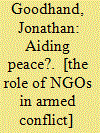

|
|
|
|
|
| Publication |
Warwickshire, ITDG Publishing, 2006.
|
| Description |
xii, 239p.
|
| Standard Number |
185339632X
|
|
|
|
|
|
|
|
|
|
|
|
Copies: C:1/I:0,R:0,Q:0
Circulation
| Accession# | Call# | Current Location | Status | Policy | Location |
| 051883 | 327.127/GOO 051883 | Main | On Shelf | General | |
|
|
|
|
| 2 |
ID:
077179
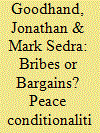

|
|
|
|
|
| Publication |
2007.
|
| Summary/Abstract |
This article focuses on the role of international aid donors in Afghanistan since the signing of the Bonn Agreement in 2001. Specifically, it explores the scope and utility of peace conditionalities as an instrument for peace consolidation in the context of a fragile war-to-peace transition. Geo-strategic and institutional concerns have generally led to an unconditional approach to assistance by international actors. It is argued that large inflows of unconditional aid risk re-creating the structural conditions that led to the outbreak of conflict. Aid conditionalities need to be re-conceptualized as aid-for-peace bargains rather than as bribes for security. Some forms of conditionality are necessary in order to rebuild the social contract in Afghanistan. This finding has wider relevance for aid donors and they should reconsider orthodox development models in 'fragile state' settings. Rather than seeing conditionalities and ownership as two ends of a policy spectrum, the former may be a necessary instrument for achieving the latter
|
|
|
|
|
|
|
|
|
|
|
|
|
|
|
|
| 3 |
ID:
124148
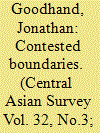

|
|
|
|
|
| Publication |
2013.
|
| Summary/Abstract |
In recent years there has been a growing focus in academic and policy circles on the changing roles of military and civilian actors in the context of multi-mandate peace and stabilization operations. This focus on 'civil-military cooperation' (CIMIC) and the related notion of the 'security-development nexus' reflect changed thinking about the causes of (and solutions to) to wars and insecurity, the role of external actors, and the balance between 'hard' and 'soft' forms of intervention. This article explores the civil-military interface in Afghanistan, focusing on the changing role of NGOs and specifically their growing but troubled relationship with externally promoted statebuilding and counterinsurgency. A recurring theme in the article is that of contested boundaries; CIMIC has been the site of intensive 'boundary work' in which NGOs and the military seek to negotiate or contest where boundaries are drawn and who has the power to draw (and police) them.
|
|
|
|
|
|
|
|
|
|
|
|
|
|
|
|
| 4 |
ID:
082227
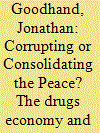

|
|
|
|
|
| Publication |
2008.
|
| Summary/Abstract |
This article examines how the drugs economy emerged, evolved and adapted to transformations in Afghanistan's political economy. With a primary focus on the conflictual war to peace transition following the signing of the Bonn Agreement, the relationship between drugs and political (dis)order is explored. Central to the analysis is an examination of the power relationships and institutions of extraction that developed around the drug economy. Expanding upon a model developed by Snyder (2004), it is argued that joint extraction regimes involving rulers and private actors have tended to bring political order whereas private extraction regimes have led to decentralized violence and political breakdown. This model helps explain why in some parts of Afghanistan drugs and corruption have contributed to a level of political order, whereas in other areas they have fuelled disorder. Thus, there is no universal, one-directional relationship between drugs, corruption and conflict. Peacebuilding involves complex bargaining processes between rulers and peripheral elites over power and resources and when successful leads to stable interdependencies. Counter-narcotics policies have the opposite effect and are thus fuelling conflict
|
|
|
|
|
|
|
|
|
|
|
|
|
|
|
|
| 5 |
ID:
017498
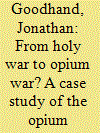

|
|
|
|
|
| Publication |
2000.
|
| Description |
265-280
|
|
|
|
|
|
|
|
|
|
|
|
|
|
|
|
| 6 |
ID:
058640
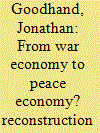

|
|
|
| 7 |
ID:
180046
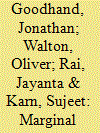

|
|
|
|
|
| Summary/Abstract |
In post-war transitions, how do centre-periphery relations change, and what is the role of actors at the margins of the state in negotiating these changes? This article explores these questions by examining Nepal’s post-war transition following the 2006 Comprehensive Peace Agreement focusing on three borderland districts (Saptari, Bardiya and Dolpa). The article analyses contrasting dynamics in these districts to highlight changes in centre-periphery relations across several areas including state reform, the economy, and transitional justice. The analysis shows how post-war transitions often generate new forms of contentious politics, and how groups at the margins can push back against emerging political settlements to reshape politics at the centre. The ambiguities and contradictions inherent to these processes are explored, with state restructuring processes susceptible to elite capture, and re-balancing of power between centre and periphery also coinciding with continuing or increased divisions and inequalities within borderland regions.
|
|
|
|
|
|
|
|
|
|
|
|
|
|
|
|
| 8 |
ID:
124145
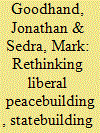

|
|
|
|
|
| Publication |
2013.
|
| Summary/Abstract |
This special issue coincides with a period of large-scale international troop withdrawals from Afghanistan, with a scheduled transition to 'Afghan ownership' in 2014. This latest 'transition' in Afghanistan's protracted conflict represents an interesting juncture at which to analyse and assess the record of statebuilding efforts in the country and their wider implications. In many respects, the changing narratives around intervention and statebuilding in Afghanistan resonate with and reflect wider shifts in thinking and policies related to security, peacebuilding, and statebuilding.
|
|
|
|
|
|
|
|
|
|
|
|
|
|
|
|
| 9 |
ID:
113914
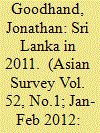

|
|
|
|
|
| Publication |
2012.
|
| Summary/Abstract |
Local elections consolidated the Mahinda Rajapaksa administration's grip on power. State-led efforts to stimulate economic growth continued with major infrastructure projects in the northeastern and southern parts of Sri Lanka. No significant progress was made toward a political settlement and reconciliation with the Tamil community, and the government came under increasing international pressure about its conduct in the last months of the civil war after the release of the United Nations Advisory Panel report.
|
|
|
|
|
|
|
|
|
|
|
|
|
|
|
|
| 10 |
ID:
119091
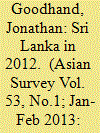

|
|
|
|
|
| Publication |
2013.
|
| Summary/Abstract |
Since the end of the civil war in May 2009, Sri Lanka's government has continued to consolidate the unitary state and centralize power by combining political reform, patronage, and economic development. However, two forces countering such unity and centralization became evident during the course of the year. First, tensions and contradictions associated with the simultaneous pursuit of political centralization alongside rapid economic development and liberalization. Second, there has been an intensification of external pressures to bring about a political settlement with the Tamils and to address government accountability, including its alleged involvement in war crimes.
|
|
|
|
|
|
|
|
|
|
|
|
|
|
|
|
| 11 |
ID:
051255
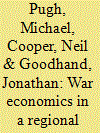

|
|
|
|
|
| Publication |
London, Lynne Reinner, 2004.
|
| Description |
xiii, 273p.
|
| Series |
Project of the International Peace Academy
|
| Standard Number |
1588262111
|
|
|
|
|
|
|
|
|
|
|
|
Copies: C:1/I:0,R:0,Q:0
Circulation
| Accession# | Call# | Current Location | Status | Policy | Location |
| 048140 | 330.9/Pug 048140 | Main | On Shelf | General | |
|
|
|
|
| 12 |
ID:
155009
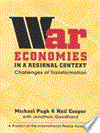

|
|
|
|
|
| Publication |
New Delhi, Viva Books, 2017.
|
| Description |
xiii, 273p.: ill.pbk
|
| Series |
Project of the International Peace Academy
|
| Standard Number |
9789386385888
|
|
|
|
|
|
|
|
|
|
|
|
Copies: C:1/I:0,R:0,Q:0
Circulation
| Accession# | Call# | Current Location | Status | Policy | Location |
| 059175 | 330.9/PUG 059175 | Main | On Shelf | General | |
|
|
|
|
|
|
|
|
|